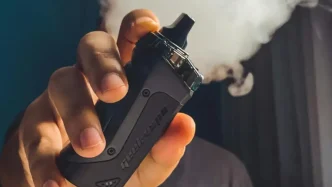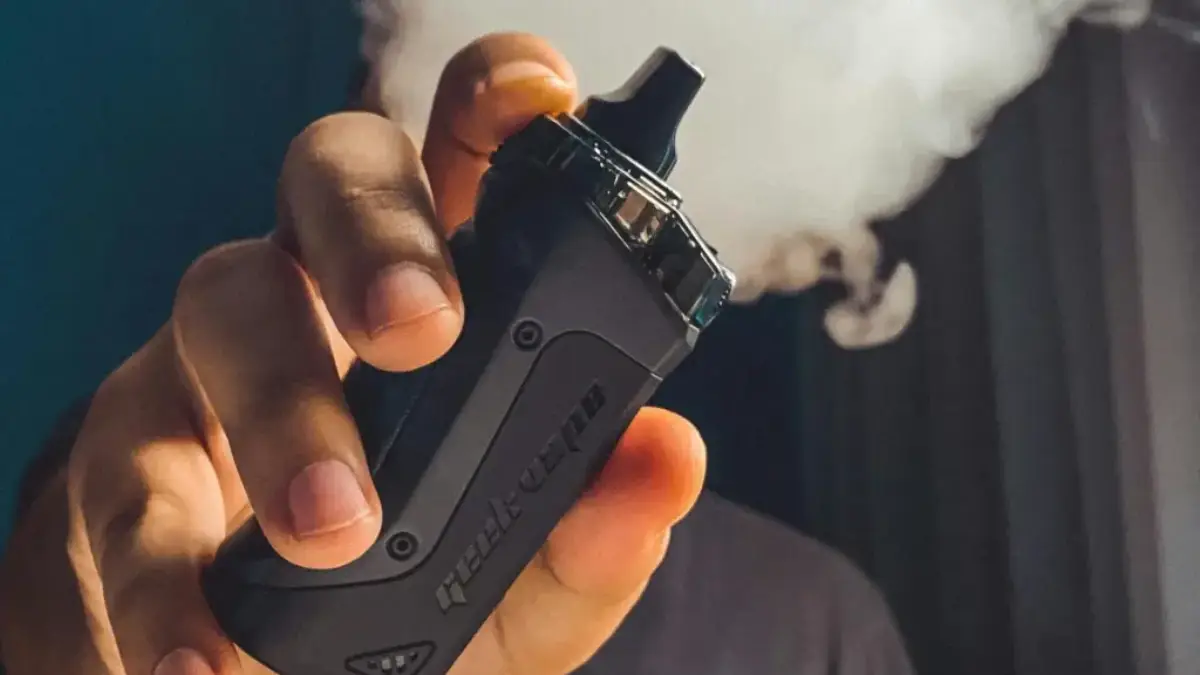In a dramatic confrontation on July 10, 2025, a Health Sciences Authority (HSA) officer in Singapore leapt into a moving car to prevent a suspected peddler from escaping during a raid on Bishan Street 13. The incident, part of a broader crackdown on e-vaporisers, underscores the city-state’s intensifying efforts to curb a growing public health crisis fueled by the emergence of drug-laced vape pods, known as Kpods. As the government grapples with a near tripling of cases involving etomidate-laced vapes in the first half of 2025, questions loom over whether current laws and enforcement strategies are sufficient to tackle this insidious threat.
A High-Stakes Chase in Bishan
The operation in Bishan Street 13 unfolded with cinematic intensity. HSA officers, acting on intelligence, surrounded a grey car believed to belong to a seller of illegal e-vaporisers. As they approached, the driver—later identified as a 27-year-old man—revved the engine and attempted to flee. In a split-second decision, one officer opened the front door and jumped into the moving vehicle, forcing the driver to halt roughly 50 meters down the road.
A search of the car revealed a trove of contraband: 28 vape devices, 814 vape pods—many suspected to be Kpods—and envelopes marked for delivery. The haul also included folders labeled with brand names like “Zombie” and “USDT” hinting at an organized distribution network. A subsequent raid on the suspect’s nearby residence uncovered additional vapes and components, though the man insisted he was merely a delivery driver. This arrest marks the second in recent weeks, highlighting the scale of the challenge facing authorities.
The Rise of Kpods: A Dangerous Trend
Kpods, vape pods laced with potent substances like etomidate or ketamine, have emerged as a particularly alarming facet of Singapore’s vaping epidemic. Etomidate, classified as a poison under the Poisons Act, requires a license for importation or sale. Possession or use of such substances can result in up to two years in jail, a fine of up to $10,000 (~US$7,400), or both. Yet, the allure of these drug-laced products appears undeterred by legal consequences.
According to a report by the United Nations Office on Drugs and Crime in May 2025, etomidate abuse is on the rise across East and Southeast Asia, with Singapore no exception. Official figures paint a stark picture: cases involving etomidate-laced vape pods in Singapore surged to 28 in the first six months of 2025, compared to just 10 for the entirety of 2024. This near tripling of incidents has prompted urgent discussions within the government, with the Ministry of Health (MOH) and Ministry of Home Affairs indicating that enhancements to current enforcement laws are under consideration.
From Nightclubs to Online Networks: A Multi-Faceted Problem
The vaping scourge extends beyond street-level peddlers to online platforms and social circles. In late June 2025, HSA raided a residence near Yishun Avenue 6, apprehending a 22-year-old woman suspected of selling Kpods via social media. Three of her colleagues—two women aged 22 and 33, and a 32-year-old man—were also present, appearing disoriented after reportedly inhaling Kpods just before the raid. The operation netted 219 vapes and related components, many believed to be laced with drugs. Reports suggest the woman, a nightclub hostess, sold to customers including her coworkers, illustrating how personal and professional networks can fuel the spread of these dangerous products.
Online platforms like Telegram have become fertile ground for illicit trade. Undercover investigations have revealed sellers offering Kpods for as little as $140 (~US$103) for two units, complete with delivery. The speed and anonymity of these transactions pose significant challenges for enforcement agencies, which must navigate a digital landscape where listings can be posted and removed in hours.
A Multi-Agency Offensive
Singapore’s response to the vaping crisis involves a coordinated, multi-agency approach. HSA, tasked with leading enforcement efforts, conducts multiple operations weekly targeting both physical and online distribution networks. Jessica Teo, assistant group director of HSA’s Vigilance, Compliance and Enforcement Cluster, emphasized the need for a comprehensive strategy. “We have intensified operations against both physical and online distribution networks, strengthened border controls with ICA, and increased enforcement presence in public spaces where vaping is prevalent” she stated on July 10, 2025, as reported by local outlets.
Collaboration with the Immigration and Checkpoints Authority (ICA) has bolstered efforts to curb smuggling at Singapore’s borders. Between January 2024 and March 2025, over 20,800 travelers were screened at air, land, and sea checkpoints during joint HSA-ICA operations, resulting in 101 individuals caught with e-vaporisers. Additionally, ICA identified 91 smugglers during this period, referring them to HSA for further action. Major hauls have included an January 2025 raid on an industrial unit, where authorities seized over 8,700 vapes and components worth approximately $137,000 (~US$101,000), including etomidate-laced devices.
The scale of seizures is staggering. From January 2024 to March 2025, MOH and HSA reported confiscating vapes and related components valued at over $41 million (~US$30.2 million). Arrests have also skyrocketed, with more than 14,600 individuals apprehended in 2024 alone, compared to just 4,916 in 2022. Among the largest operations was a March 2024 raid following a roadblock near St Andrew’s Road, which led to the discovery of two warehouse units containing over 400,000 vapes worth more than $6 million (~US$4.4 million)—the biggest haul to date.
Digital Crackdowns and Public Education
Beyond physical enforcement, HSA has partnered with e-commerce and social media platforms to remove illegal listings. Between January 2024 and March 2025, over 6,800 online listings for e-vaporisers and components were taken down, more than double the 3,100 removed in 2023. Additionally, 15 individuals were fined for posting images or videos of e-vaporisers on their social media accounts during the same period, signaling a zero-tolerance approach to digital promotion of these products.
Public education remains a critical pillar of Singapore’s strategy. Authorities aim to raise awareness about the health risks and legal consequences of vaping, particularly among younger demographics who may be drawn to the trend through social media or peer influence. The combination of enforcement, border control, and education seeks to address both supply and demand, though the persistence of drug-laced vapes suggests that more innovative solutions may be needed.
Legal and Policy Challenges Ahead
The emergence of Kpods has exposed gaps in Singapore’s regulatory framework. While the Poisons Act provides a basis for prosecuting possession and sale of substances like etomidate, the rapid evolution of vaping products—particularly those laced with drugs—has outpaced existing laws. The government’s acknowledgment that it is reviewing enforcement measures signals a potential shift toward harsher penalties or broader legislative powers for agencies like HSA.
One area of concern is the involvement of organized networks. Recent court cases, such as the charging of two men in 2025 for attempting to break into an HSA evidence warehouse to steal confiscated vapes, point to deeper criminal enterprises. The men were reportedly acting on behalf of an individual named Chua Wee Ming, accused of importing vapes for distribution. Such incidents underscore the high stakes of the trade and the lengths to which distributors will go to protect their interests.
A Growing Public Health Crisis
The health implications of drug-laced vapes are profound. Etomidate, often used as an anesthetic in medical settings, can cause severe respiratory depression and other adverse effects when misused. Ketamine, another substance found in Kpods, carries risks of addiction and psychological harm. The disoriented state of suspects during the Yishun raid offers a grim glimpse into the immediate impact of these products on users, many of whom may be unaware of the potency of what they are inhaling.
For Singapore, a nation known for its strict laws and low tolerance for drug-related offenses, the vaping epidemic represents a test of its zero-tolerance stance. The tripling of etomidate-related cases in just six months of 2025 suggests that without decisive action, the problem could spiral further, affecting not just individual users but entire communities through the ripple effects of addiction and crime.
Looking Forward: Can Singapore Stem the Tide?
As Singapore ramps up its fight against e-vaporisers, the road ahead remains uncertain. The dramatic Bishan Street chase and the staggering hauls from recent raids are victories, but they are also reminders of the scale of the challenge. With drug-laced vapes infiltrating social circles and online spaces, authorities must balance enforcement with prevention, ensuring that education and policy keep pace with the ingenuity of illicit networks.
The government’s contemplation of enhanced laws offers hope for a stronger deterrent, but the question remains: will these measures be enough to dismantle the supply chains and curb demand in a digital age? As operations continue and more suspects are brought to justice, Singapore’s battle against vaping is far from over, with the health and safety of its citizens hanging in the balance.
















